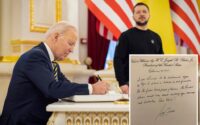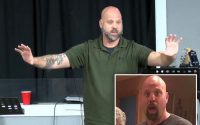Turkish President Erdogan holds early lead in national election, state-run news claims
Early results from Turkey’s national election Sunday showed President Recep Tayyip Erdogan with a solid lead after nearly 20% of ballot boxes were counted, the Turkish state-run news agency says.
Erdogan had 55% of the vote, compared to 39% garnered by main opposition leader Kemal Kilicdaroglu, Anadolu Agency reported.
Opinion surveys indicated the increasingly authoritarian Erdogan entered his bid for reelection trailing a challenger for the first time.
Faik Oztrak, a spokesman for Kilicdaroglu’s center-left party, cautioned the early returns were preliminary and said the “picture is extremely positive” for the opposition.
Erdogan has ruled Turkey as prime minister or president since 2003.
Pre-election polling suggested he faced the toughest reelection battle of his two decades leading the NATO member country, which has grappled with economic turmoil and the erosion of democratic checks and balances in recent years.
Polls closed in the late afternoon after nine hours of voting in the national election that could grant Erdogan, 69, another five-year term or see him unseated by Kilicdaroglu, who campaigned on a promise to return Turkey to a more democratic path.
If no candidate receives more than 50% of the vote, the winner will be determined in a May 28 run-off.

Voters also elected lawmakers to fill Turkey’s 600-seat parliament, which lost much of its legislative power under Erdogan’s executive presidency.
If his political alliance wins, Erdogan could continue governing without much restriction.
The opposition has promised to return Turkey’s governance system to a parliamentary democracy if it wins both the presidential and parliamentary ballots.
Pre-election polls gave a slight lead to Kilicdaroglu, 74, who was the candidate of a six-party opposition alliance.

He leads the center-left, pro-secular Republican People’s Party, or CHP.
More than 64 million people, including 3.4 million overseas voters, were eligible to vote in the elections, which come the year the country will mark the centenary of its establishment as a republic — a modern, secular state born on the ashes of the Ottoman Empire.
Voter turnout in Turkey is traditionally strong, reflecting citizens’ continued belief in democratic balloting.
Yet Turkey has seen the suppression of freedom of expression and assembly under Erdogan, and it is wracked by a steep cost-of-living crisis that critics blame on the government’s mishandling of the economy.

The president believes low-interest rates tame inflation, in contrast to orthodox economic theory, and pressured the central bank to reflect his view.
The latest official statistics showed inflation at about 44%, down from around 86%, though independent experts believe costs continue to rise at a much higher rate.
The price of vegetables became a campaign issue for the opposition, which used an onion as a symbol.


Turkey is also reeling from the effects of a powerful earthquake that caused devastation in 11 southern provinces in February, killing more than 50,000 people in unsafe buildings.
Erdogan’s government has been criticized for its delayed and stunted response to the disaster, as well as a lax implementation of building codes that exacerbated the casualties and misery.
Internationally, the elections were being watched closely as a test of a united opposition’s ability to dislodge a leader who has concentrated nearly all state powers in his hands.
In 2016, Erdogan survived a military coup attempt he blamed on followers of a former ally, U.S.-based cleric Fethullah Gulen.

The attempt triggered a large-scale crackdown on Gulen’s supporters and other critics, including pro-Kurdish politicians, for alleged links to terror groups.
In this election campaign, Erdogan used state resources and his domineering position over the media to try to woo voters.
He accused the opposition of colluding with “terrorists,” of being “drunkards” and of upholding LGBTQ+ rights, which he depicts as threatening traditional family values in the predominantly Muslim nation.
In a bid to secure support from citizens hit hard by inflation, he has increased wages and pensions and subsidized electricity and gas bills, while showcasing Turkey’s homegrown defense and infrastructure projects.
He also extended the political alliance of his ruling Justice and Development Party, or AKP, to include two nationalist parties, a small leftist party, and two marginal Islamist parties.
Kilicdaroglu’s six-party Nation Alliance pledged to dismantle an executive presidential system narrowly voted in by a 2017 referendum.
The opposition alliance also promised to restore the independence of the judiciary and the central bank and to reverse crackdowns on free speech and other forms of democratic backsliding under Erdogan.
The alliance includes the nationalist Good Party led by former Interior Minister Meral Aksener, a small Islamist party, and two parties that splintered from the AKP, one led by a former prime minister, Ahmet Davutoglu, and the other by a former finance minister, Ali Babacan.
The country’s main Kurdish political party, currently Turkey’s second-largest opposition grouping, is supporting Kilicdaroglu in the presidential race.

Erdogan’s government in recent years has targeted the party’s leaders with arrests and lawsuits.
At polling stations, many voters struggled to try to fold bulky ballot papers — they featured 24 political parties competing for seats in parliament — and to fit them into envelopes along with the ballot for the presidency.
“It’s important for Turkey. It’s important for the people,” said Necati Aktuna, a voter in Ankara. “I’ve been voting for the last 60 years. I haven’t seen a more important election that this one.”

Ahmet Yener, the head of the Supreme Electoral Board, said the voting ended with no report of any “negative” incidents.
“We have all missed democracy so much. We all missed being together,” Kilicdaroglu said after voting at a school in Ankara, where his supporters chanted “President Kilicdaroglu!”
“From now on, you will see that spring will come to this country,” he said.
Erdogan said voting was underway “without any problems,” including in the earthquake-affected region.
“It is my hope that after the evening’s count … there will be a better future for our country, our nation, and Turkish democracy,” Erdogan said.
Also running for president was Sinan Ogan, a former academic who has the backing of an anti-immigrant nationalist party.
Another candidate, center-left politician Muharrem Ince, dropped out of the race on Thursday following a significant drop in his ratings.
But the country’s election board said his withdrawal was invalid and votes for him would get counted.
Some have expressed concerns over whether Erdogan would cede power if he lost.
Erdogan said in an interview with more than a dozen Turkish broadcasters on Friday that he came to power through democracy and would act in line with the democratic process.
Balloting in the 11 provinces affected by the earthquake, where nearly 9 million people were eligible to vote, has raised concerns.

Around 3 million people have left the quake zone for other provinces, but only 133,000 people registered to vote at their new locations.
Political parties and non-governmental organizations planned to transport voters by bus but it was not clear how many made the journey back.
Many of the quake survivors cast votes at makeshift polling stations erected in schoolyards.
In Diyarbakir, a Kurdish-majority city that was hit by the earthquake, Ramazan Akcay arrived early at his polling station to cast his vote.
“God willing it will be a democratic election,” he said. “May it be beneficial in the name of our country.”


